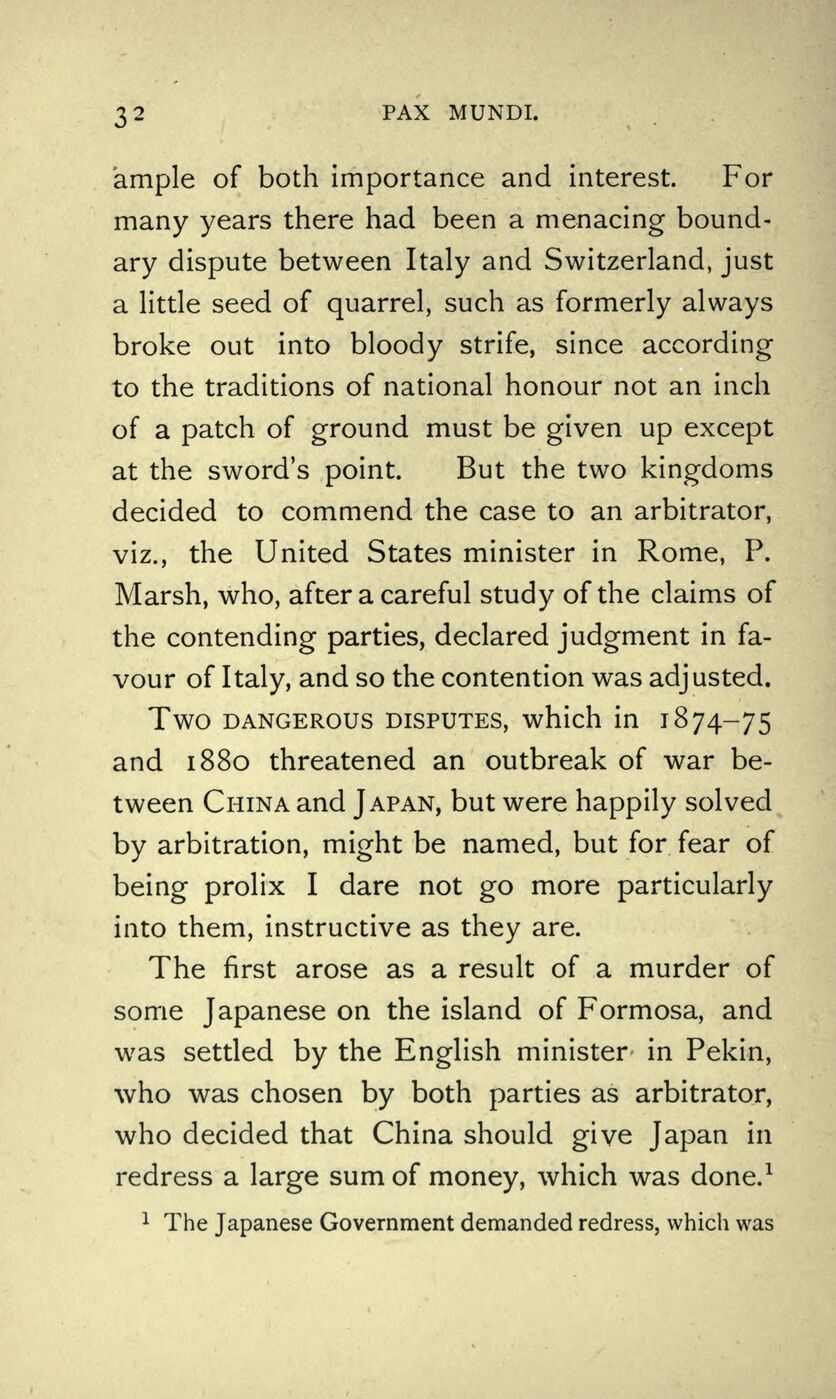
Full resolution (JPEG)
- On this page / på denna sida
- Arbitration

<< prev. page << föreg. sida << >> nästa sida >> next page >>
Below is the raw OCR text
from the above scanned image.
Do you see an error? Proofread the page now!
Här nedan syns maskintolkade texten från faksimilbilden ovan.
Ser du något fel? Korrekturläs sidan nu!
This page has been proofread at least once.
(diff)
(history)
Denna sida har korrekturlästs minst en gång.
(skillnad)
(historik)
example of both importance and interest. For
many years there had been a menacing
boundary dispute between Italy and Switzerland, just
a little seed of quarrel, such as formerly always
broke out into bloody strife, since according
to the traditions of national honour not an inch
of a patch of ground must be given up except
at the sword’s point. But the two kingdoms
decided to commend the case to an arbitrator,
viz., the United States minister in Rome, P.
Marsh, who, after a careful study of the claims of
the contending parties, declared judgment in
favour of Italy, and so the contention was adjusted.
Two dangerous disputes, which in 1874–75
and 1880 threatened an outbreak of war
between China and Japan, but were happily solved
by arbitration, might be named, but for fear of
being prolix I dare not go more particularly
into them, instructive as they are.
The first arose as a result of a murder of
some Japanese on the island of Formosa, and
was settled by the English minister in Pekin,
who was chosen by both parties as arbitrator,
who decided that China should give Japan in
redress a large sum of money, which was done.[1]
[1] The Japanese Government demanded redress, which was
at first refused by China. This led to a stormy
correspondence, which at last became so bitter that both sides
prepared for war. The Japanese troops had already taken
possession of Formosa. During this dangerous juncture,
the British minister in Pekin, Sir Thomas Wade, offered to
mediate as an arbiter. The offer was accepted, and led to
an agreement between the Chinese Government and the
Japanese ambassador in Pekin, by which China was to
pay Japan 500,000 taels, and the Japanese troops were to
evacuate Formosa. When Lord Derby, who was at that
time Foreign Secretary of Great Britain, received a telegram
from Sir Thomas Wade respecting this happy result, he
answered him: “It is a great pleasure to me to present to
you the expression of the high esteem with which her
Majesty’s Government regards you for the service you have
rendered in thus peaceably adjusting a dispute which
otherwise might have had unhappy consequences, especially to
the two countries concerned, but also for the interests of
Great Britain and other parties to treaties.” Sir Harry
Parkes, the English minister in Japan, wrote to Lord Derby,
that the Mikado, the Emperor of that land, had invited him
to an interview for the purpose of expressing his satisfaction
at the result, and through him to present his warm thanks for
his brave and efficient service. The Japanese minister in
London also called upon Lord Derby and expressed the
thanks of his Government to Mr. Wade. “He could assure
me,” said Lord Derby, when he repeated the words of his
excellency, “that the service which has thus been rendered
will remain in grateful remembrance among his
countrymen.”
<< prev. page << föreg. sida << >> nästa sida >> next page >>
Project Runeberg, Mon Dec 11 14:29:50 2023
(aronsson)
(diff)
(history)
(download)
<< Previous
Next >>
https://runeberg.org/paxmundi/0052.html



